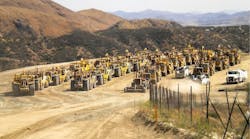Like other parts of the country, Wisconsin is looking at a construction-labor shortage over the coming decades. State projections predict that the need for specialty trade workers alone will have grown by 20 percent from 2004 to 2014.
To keep up with the demand, we will need to both attract new workers into the construction labor force and find ways to use the accumulated knowledge and experience of "mature" older workers.
Chad Ferguson, safety director for contractor Kraemer Brothers, LLC, of Plain, says that the company provides all of its employees opportunities for learning through training sessions and meetings on topics ranging from safety and productivity, to quality and infection control (important to working in medical environments). Says Ferguson, "in the meetings, we usually try to have some of the more-experienced workers share their knowledge so less-experienced employees can learn from it." Ferguson says that Kraemer Brothers has near 100-percent participation in training from all of its employees, both young and mature.
In addition, says Ferguson, Kraemer Brothers always sets up mature, more-experienced workers as mentors who can pass on their expertise to help younger apprentices develop.
Another entity that really puts the experience of mature workers to use is the operating engineers' union. Local 139, which covers all of Wisconsin, operates a 400-acre training facility in Coloma. Dan Sperberg manages the union's training program, which trained 4,200 students overall, last year.
Says Sperberg, "We have 12 full-time trainers and 15 more who work during our heavy winter training season. All of them are former operators who had been in the seat for 10, 20, 30, or even 40 years. We even have retirees who come back to share their knowledge with students."
Many of those students are mature workers who have reached journeyman status but want to further refine their skills, learn about new control systems or broaden the range of equipment they can operate.
Sperberg says that advancing technology, such as GPS, and changing regulations also draw more-experienced operators as well as new ones. "We get younger and older operators in classes because the information is new to everyone," he said.
Operating Engineers' Business Manager Terry McGowan, himself a former operator, says that more mature workers sometimes move from the operator's seat to an office chair as business agents, where they must combine their valuable on-the-job experience with a new set of skills.
"It can be very challenging," says McGowan. "They have to understand labor-management relations, legal agreements, labor law, health care regulations, pension laws, and many other topics. It takes a willingness to learn new things they haven't dealt with before."
McGowan says that during his years in the industry, he's also seen mature workers move from the operator's seat to other jobs where their experience is valuable. For example, he says, operators have gone from running equipment to setting the stakes that lay out a job, becoming craft or grade foremen, supervisors, or superintendents.
In addition, he says that some mature workers have left the operator's seat for a contractor's or dealer's maintenance shop, where their hands-on knowledge of the equipment is also valuable.
That thorough knowledge of equipment and the construction process, says McGowan, has also enabled some older workers to contribute in administrative or managerial positions, like equipment supervisor, coordinator or dispatcher. "Their practical experience enables them to match the right equipment to a specific job," he says. Still two more related jobs with successful transitions are surveying and estimating, he says.
Another area where mature workers are contributing is safety training and management.
Bruce Morton, of safety consultant Platt Safety Services, of Franklin, says that although many safety managers now have college degrees, there are also many effective safety managers who are mature workers that made the transition from the work crew.
Says Morton, "Both approaches can work. People with the academic safety background can learn about a work process, then apply safety principles to it. And, conversely, people who have worked in construction can learn safety regulations and procedures, then apply them to the processes they know so well."
Morton says that Platt Safety's parent company, Platt Construction, uses experienced workers to circulate among job sites to help make jobs go more smoothly. "Because their experience has taught them what to expect in a wide variety of jobs, they can foresee and avoid potential problems — making projects go far smoother," he says.
Although some segments of Wisconsin's construction industry are successfully tapping the experience of mature workers, the overall industry will have to find even more ways to tap this valuable resource in order to meet the demographic challenges looming in the not-too-distant future.



